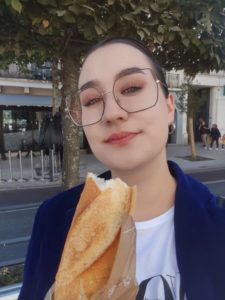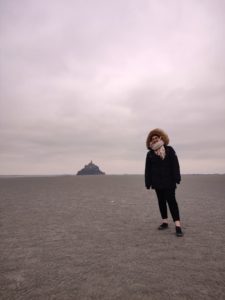Melanie Kröhn

1. Why do you think a semester abroad is crucial to your master’s study?
I believe that studying abroad is a valuable experience regarding both personal as well as academic development. Experiencing life in another country and meeting people from many different backgrounds allows students to gain insight and understanding of culture(s). It is also really interesting and beneficial to try university teaching in another country and gain new perspectives on the knowledge you’ve previously attained.
2. Where did you go for your semester abroad?
I studied at ESSCA School of Management in Angers, which is in western France and less than two hours from both Paris and the seaside. Angers is about the same size as Erlangen and has a big, vibrant student life. ESSCA is a private business school with a great reputation in France as well as internationally.
3. How did you find out about the study place in Angers, and how was the application process?
After we were not able to do our semester abroad in Beijing as initially planned due to the Chinese COVID-19 restrictions, we got the opportunity to apply to the partner universities of the master’s program Development Economics and International Studies (MADEIS). The application process was quite on short notice and only took us a few weeks, but I am beyond grateful that I was given this opportunity!

4. How did you finance your semester abroad?
I got funding from ERASMUS+ to finance my semester abroad as well as I was able to continue working remotely at my student assistant job during my time in France. In addition, I also was able to receive student housing benefits from Caisse d’Allocations Familiales, a social security body of the French government, which supports international students in paying for their accommodation during their stay in France. This student benefit depends on the personal situation and the amount of rent and is available to any student studying in France including international and exchange students.
5. What classes did you choose at the university? And why?
One of the courses I really enjoyed taking was Contemporary European Politics, which focused on the European Union and its political and economic challenges. Among other things, we’ve got the opportunity to create our own EU policy drafts as well as case studies on EU lobbying and trade agreements. For me, this course was an extension of what I had previously learned at SDAC and offered a practical, hands-on application of that theoretical knowledge.
I also chose to focus on marketing since I hadn’t taken any courses in this area before and was surprised by how much of my knowledge of decision-making I could apply in these courses. In Wine Marketing and Fashion Sourcing and Marketing we got to propose different sourcing, marketing, and collection plans for brands which featured decision-making in a way which we don’t typically focus on at SDAC.
Additionally, I was able to work on my French language skills during the semester. In the language course I took, we focused on improving our ability to speak French and in particular le français parlé – spoken French – which is almost a language of its own with specific grammar rules, vocabulary, and pronunciations.

6. How do you like France, especially Angers?
I really enjoyed living in France. Although as a neighbouring country it is close to Germany, the atmosphere and culture there were quite different and had much more of a southern European flair. Angers has a big, vibrant student life, so in the evenings students meet in the many restaurants and bars in the city centre, and there’s always something happening there. In addition, Angers is quite close to both Paris and the seaside and has a great rail network, so it is easy to travel and see new places.
7. What were you doing in your free time?
I joined Year 3 courses in France, which meant that I had quite a lot of group works and in-class assignments during the semester. However, at the beginning of the semester, I did get the chance to travel to different places in France, mainly in the Val de Loire and on the West coast but of course to Paris as well. Museums and landmarks oftentimes are free of charge for EU citizens under the age of 26 in France, so I did a lot of sightseeing and visited many museums. Angers also has an ice hockey team in France’s top league, whose season just started during my time in France, so I went to lots of their games but also to ice skating and a national figure skating competition.
8. Did you attend any extracurricular activities?
I didn’t attend many extracurricular activities at the university, even though ESSCA offered some events, such as the Mercuriale Gala, which is completely organised by students, or a Halloween lunch. I did, however, join an excursion to Normandy, where we visited the D-Day Landing Beaches as well as a German and American military cemetery, which was really interesting.

9. What were your impressions of the student community and life at the university in general?
University life in France is quite different to the one I was used to in Germany. The Year 3 courses were twice the length of the courses in Germany and thus had twice the amount of course material, which took some time to get used to in the beginning. Additionally, we had continuously graded assessments throughout the semester, which consisted exclusively of group projects. Nevertheless, the courses were really interesting and very hands-on. We had many opportunities to put what we had learned into practice when creating our own projects. What I particularly liked was that we had several lecturers per course and were thus taught by lecturers who had a lot of work experience and were experts in their respective fields.
10. Based on your experience, would you recommend such a semester abroad to other students?
I would definitely recommend a semester abroad to anyone who is interested in experiencing life in another country and getting to know a different culture. The semester abroad has taught me a lot of valuable lessons, I’ve made great friends from all over the world, and I have benefited greatly from the different approach in teaching of my exchange university.
